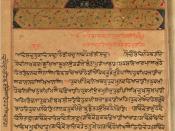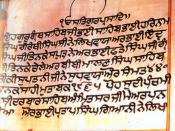One of the newest religions to be of influence today
The Sikh Religion was founded by Guru Nanak (1469-1539 AD) who was born in Panjab, Pakistan. A brief reference about the social inequalities of that period, especially with respect to women, helps to appreciate the progressive doctrine adopted by the Sikh Gurus. For centuries, the status of women in India was being systematically downgraded. The caste system, economic oppression, denial of right to property and inheritance, a false sense of impurity attached to menstruation and child birth, deliberate deprivation of education led to the deterioration of women's position in society. This was further justified by religious sanctions as was done by Manu, the Hindu law giver:
By a girl, by a young woman, or even by an aged one, nothing must be done independently, even in her own house.
In childhood a female must be subject to her father, in youth to her husband, when her lord (husband) is dead to her sons;
a woman must never be independent.
She must not seek to separate herself from her father, husband, or sons;
by leaving them she would make both her own and her husband's families contemptible.
Code of Manu 5:147-49
Woman was referred to as a 'seducer', 'unclean', and a 'temptress'. This was awful and totally sexist. She was denied the right to preach or to participate in other religious rites. Manu went to the point of declaring that the service of the husband by the woman is considered to be equal to the service of God.
"Though he be destitute of virtue, or seeking pleasure elsewhere,
or devoid of good qualities, yet a husband must be constantly worshipped as god by a faithful wife.
No sacrifice, no vow, no fast must be performed by women apart from their...



Women
Well written piece. Nice work.
3 out of 3 people found this comment useful.